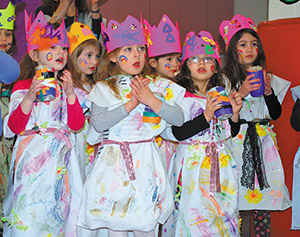
Because Purim is celebrated on the 14th day of the Hebrew month of Adar (on the 15th in Jerusalem), the whole month takes on a festive role in the Jewish imagination. Thus, the tradition says: “When Adar begins, we make merry.”
Israeli children have a special way of fulfilling this commandment. It’s called Takanon Adar—the rules of Adar. On Rosh Hodesh Adar (which occurs this year on Thursday and Friday 19-20), Takanon Adar will come into effect in national-religious schools in Israel (ultra-Orthodox schools and non-religious schools, it seems, are less committed to the Adar spirit).
Through the Takanon, students issue rules for their teachers that must be followed—or else the teachers cannot teach. Thus, for the two weeks leading up to Purim (which this year begins on Wednesday night March 4), there are specified days when teachers have to come to class in slippers and pajamas, when they must permit gum-chewing in class, and when they have to start class by telling either a joke or of a fadiha (a time when they embarrassed themselves). Needless to say, homework is very much discouraged under the rules for Adar.
This is my 18th Adar in Israel. The longer I am here, the mellower is my attitude toward school. Israelis are much less uptight about school than American Jews. I don’t think that I ever cut a class in high school; yet I didn’t particularly think that I was a goody-goody. (My children, however, assure me that I was one; or as they say using the appropriate slang Hebrew word: “Face it Dad, you were a super chnooon.”) I never learned the art of cutting class (another slang Hebrew word: l’havriz means “to cut”). I was always concerned that I would get into “trouble” or that it would be difficult for me to make up missed assignments. Israeli schools sort of take the guesswork out of cutting by institutionalizing it. Kids, especially in the upper grades, are routinely let out of classes anytime a teacher is absent. The educational system seems to tell the kids: We know that the most important thing in high school is to socialize, and we’re going to allow you a lot of opportunity to do this.
It turns out that the smartest girl in my high school class at the Yeshivah of Flatbush also feels that she worked too hard in school. A few years ago we spent a Shabbat with Rina Polin (now Langer) and her family at Kibbutz Ein Hanatziv. (Rina and her husband Meir made aliyah 30 years ago and have four children.) I was astounded to hear Rina—whom all the teachers adored—confess that, like me, she felt that she did not socialize enough in high school. Thankfully, my children more than corrected for their father’s fault in this matter.
Endnote on Halloween, Valentine’s Day, and Purim: Purim is Israel’s masquerade holiday and Halloween is America’s. On one of the days leading up to Purim all Israeli children, religious and secular alike, are given the opportunity to come to school in costume (there is no school on the holiday itself). Because of this, Purim provides a stark contrast between Jewish life in Israel and in the diaspora. It makes me sad to think that throughout the United States there are thousands of Jewish children from secular families who do not get to celebrate Purim (but who do relish Halloween and who will be celebrating St. Valentine’s Day on February 14 rather than Rosh Hodesh Adar a few days later). Happily, though, I live in Israel, where every Jewish child knows of this fun holiday called Purim and anxiously looks forward to it. Happy Adar!
By Teddy Weinberger













